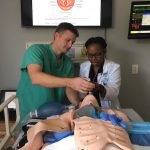Mental Health has become an even more distressing issue in modern society, the requirement for trained professionals who can assist in the care and rehabilitation of patients increases. Now more than ever, we see a high demand for mental health practitioners in almost every social and personal aspect of life and work.
Who is a Psychiatric Nurse Practitioner?
One way of becoming a part of this noble profession is training to be a Psychiatric-Mental Health Nurse Practitioner (PMHNP). In brief, a psychiatric nurse is an individual who has an advanced nursing degree and specializes in the treatment, diagnosis, and care of mental illness. These individuals can provide psychotherapy, prescribe medication, make official diagnoses and evaluate and assess treatment effectiveness in patients.
Subfields of Psychiatric Nursing

If you are want to know where you can start your practice once you’ve become a PMHNP, there are many avenues for you to consider as a psychiatric nurse. You can create your private agency or work in the more traditional setups such as hospitals and government agencies that provide mental health care services or even work independently as a consultant. These can be in the form of:
1) Child and Adolescent Mental Health Services (CAMHS)
In this line of work, you’ll be dealing closely with children and young people who suffer from emotional, behavioral, and mental issues at varying degrees of affect.
The role entails developing therapeutical relations with patients through trust, acceptance, and understanding while educating the patient and all involved in the treatment process, like family and support systems, about mental health and wellness.
Child and adolescent mental health nurses provide an essential service that is key for early intervention, management, and prevention of mental issues in individuals who may be predisposed or showing early signs of said issues. If care is provided on time, it would effectively improve long-term rehabilitation in young people.
2) Geropsychiatric Nurse
As a geropsychiatric nurse, your primary focus will be the care of older patients. You’ll be specialized in treating and caring for older adults’ complex physical and mental health requirements.
In this role, you will need to assess and diagnose a patient’s mental health status and cognitive processes. Also, you will need to understand the different health issues common in older people and assist them with daily care and treatment procedures while carefully balancing the requirements of the individual and others involved in the treatment and care of that person, such as family and loved ones.
A nurse in this field may become the primary caretaker of the individual and will have to be trained thoroughly in assessing the cognitive, functional, affective, and behavioral status. They should also have knowledge of physiological issues, the aging process, and social and cultural influences on older adults and their families.
3) Forensic Psychiatric Nurse (FPN)

Forensic psychiatric nursing is still a developing area of specialization. People in this field mainly work with individuals who are victims of crime and with offenders who are convicted of criminal offenses due to their mental health status. It’s an upcoming area of work that bridges healthcare with the judiciary system.
Nurses are trained to provide care, assess, treat and manage mental illness affecting offenders and if their condition may pose a threat to others. They also help rehabilitate survivors of assault like sexual, domestic, child, elder abuse, and many other violent crimes. They can also help juveniles in correctional institutions. Forensic nurses may also be required to reserve evidence and testify in a court of law.
4) Substance Abuse Nurse
People who specialize as substance abuse nurses work specifically to help individuals overcome their addiction to substances such as drugs and alcohol. The practitioners receive vigorous training in areas of mental health that are associated with addiction. They are also sometimes referred to as addiction nurses.
Nurses in this specialization will be required to assess patients, provide assistance to physicians in developing treatment plans, monitor treatment progress, administer medication if needed, and help with pain management.
They are also required to educate the patients and anyone directly involved with the treatment process, like loved ones, on the dangers of substance abuse. They can also help provide resources and different future treatment options.
5) Consultation-Liason Psychiatric Nurse

Nurses in this field work closely with physicians in a more traditional setup like hospitals and clinics. Their main area of focus is to interface physical and mental illnesses. The primary work involves conducting assessments and evaluations on patients, both physical and mental, and interacting with other health care providers to determine the cause of the issue. Investigate complex health issues and determine comorbid psychiatric and medical conditions.
These individuals need to conduct thorough investigations, identify complex health issues with overlapping conditions, and interact with patients with multiple complex and severe illnesses.
6) Military Mental Health Nurse
Another important field that requires the services of psychiatric nurses in the armed forces. These individuals are specially trained to assist individuals in re-entering society when their services are completed. They also have the task of rehabilitating people diagnosed with mental issues during service and creating awareness of mental health to prevent future illnesses.
They are expected to know how to assess individuals, counsel, and provide trauma management steps. The practitioners will also be required to provide inpatient and outpatient care and create awareness within the community and support system.
These are currently the most general subfields of specialization in which a psychiatric nurse can work in and practice. Other ways you can work in the field are as a family counselor, rehabilitation programs, shelters, a consultant in private cooperations, and a researcher.
Conclusion
There is an ever-increasing demand for qualified mental health professionals who can provide quality care and services to help improve patients’ well-being. It is also a pretty fulfilling role and can make a massive difference in the lives of people who require help. The field can also be quite lucrative since mental health care is necessary for almost every aspect of life and is becoming a more prominent and vital part of maintaining a balanced lifestyle.
 Nursing Trends
Nursing Trends






